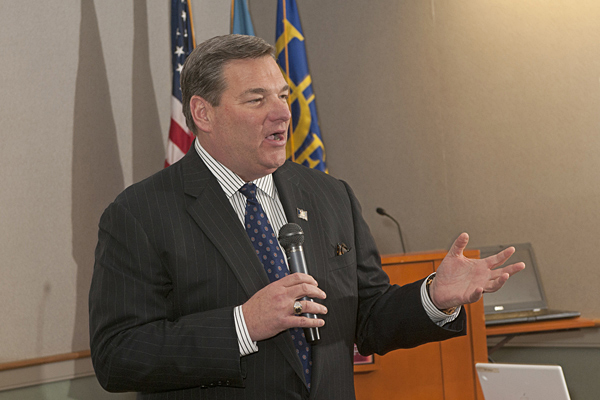In a state that maintains a certain earnest affection for institutions and power, Alan Levin looms large.
He’s a big enough guy with a booming enough a voice to command it. But in Delaware, it came mostly from his prominent tenure leading the Delaware Economic Delaware Office, which just about everybody calls DEDO, from 2009 until his departure in summer 2015. He was the state’s chief economic development architect in the immediate aftermath of the Great Recession, under Governor Jack Markell, who left office earlier this year as one of the most popular state chief executives in the country.
“People sometimes said that DEDO didn’t care enough about startups but that just wasn’t true,” said Levin, noting that the Start It Up Delaware spinout was one prominent example (Markell was also a frequent visitor to tech events and booster of the community generally). Still, Levin wanted to make clear the depths of the challenges they faced, as he was speaking on a panel at a Beacon DE networking event in Wilmington last week. “The focus then was dealing with eight percent unemployment and what could be done right now.”
He cited the $1.8 billion project to reimagine the site of a former Chrysler plant into what is now the University of Delaware STAR Campus and other large scale business growth incentivizing projects. Now that the state’s employment rate is a more satisfactory 4.5 percent, Markell’s successor John Carney can take a different tack — as his early moves have suggested he might.
“In this new administration, it’s time to find the next Dupont,” Levin said, as we reported in a recap published Monday.
To do that, focusing on core state strengths, like financial and legal services, can help, but that can’t be a limitation, just a focus.
“I’m open to anything that is legal, moral and creates careers, not just jobs,” Levin said. He mentioned repeatedly that risks are important even when they fail — like the once much cheered plan to build out a Fisker Automotive plan that never came to fruition.
“I had to kiss a lot of frogs to get a prince,” said Levin, of economic development generally. The Carney administration will need to do the same.
“Don’t come in, if you’re not ready,” he said of pitching. “You have to be the smartest guy in the room when you’re pitching your company.”
Levin gained popularity among some young tech entrepreneurs in Delaware as an economic development veteran who picked up the lingo of startup sectors. Mac Nagaswami, the cofounder of outdoor advertising company Carvertise, credits Levin with brokering his company’s pivotal first major deal, with a local Shop-Rite franchise owner.
But Levin cautions economic development executives from falling trap to hucksters and pretend founders.
“I look skeptically at any entrepreneur I meet,” Levin said. He’ll take a chance — like he did on Nagaswami — but only if he sees something. Levin noted specifically that using a lack of outside financing as an excuse is a red flag.
“Do I think there’s a lack of venture capital? No I don’t,” Levin said. “I do think there’s a lack of organized capital.”
One thing is for sure, said Levin, who now leads a consultancy called SoDel Concepts, that economic development leaders need to stretch for bold ideas, in addition to the tried and true.
He said: “There is no doubt if you’re not failing, you’re not trying.”







